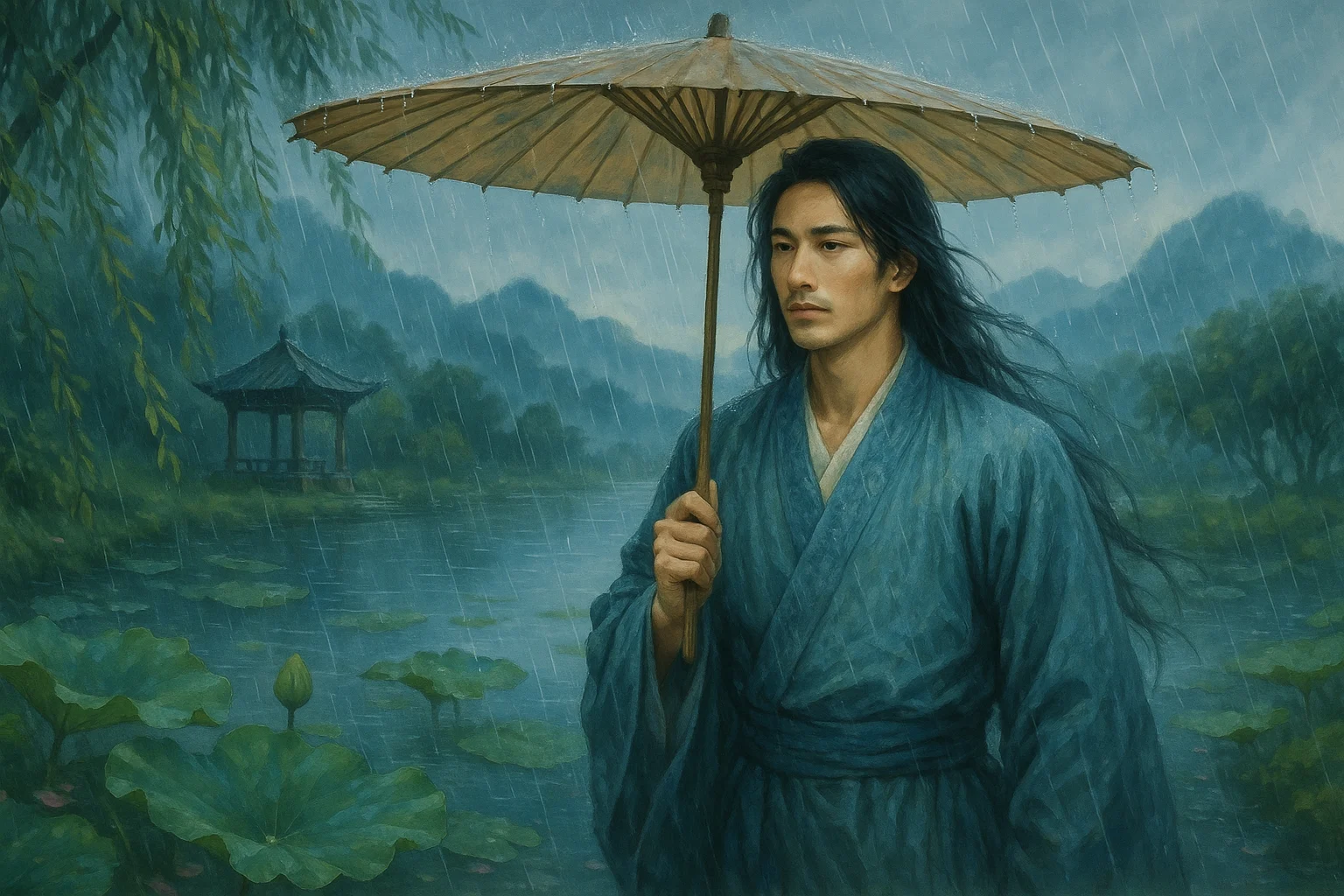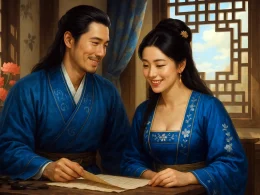Leaving miasmic clouds near Xiangtan's shore,
My broken frame can bear the road no more.
My children, unaware of exile's plight,
Claim with pride: "This land beats the south in sight!"
Original Poem
「连州阳山归路」
吕本中
稍离烟瘴近湘潭,疾病衰颓已不堪。
儿女不知来避地,强言风物胜江南。
Interpretation
This poem was composed in 1130 CE, following the Jingkang Incident when the Jin army invaded southward, leading to the fall of the Northern Song Dynasty and the establishment of its southern successor. Lü Benzhong, having fled the warfare to seek refuge in Lingnan (modern Guangdong), endured the hardships of miasmic regions while sojourning in Lianzhou (present-day Qingyuan, Guangdong), suffering both physical and mental exhaustion. This work was created during his journey northward from Yangshan to Xiangtan in Hunan, marking his departure from Lianzhou. It embodies both the weariness of travel and illness, as well as profound concerns for his homeland—a quintessential "poem of displacement" and one of the representative works of his later melancholic style.
First Couplet: "稍离烟瘴近湘潭,疾病衰颓已不堪。"
Shāo lí yānzhàng jìn Xiāngtán, jíbìng shuāituí yǐ bùkān.
Just departed the miasmic haze, nearing Xiangtan;
Yet illness and frailty have left me utterly spent.
This couplet directly establishes the journey's progress and the poet's physical state. "Miasmic haze" (烟瘴) starkly references Lingnan's hostile climate, while "just departed" (稍离) indicates the ongoing nature of the travels. The triple emphasis of "illness and frailty" (疾病衰颓), culminating in "utterly spent" (已不堪), conveys the poet's exhausted and debilitated condition, while subtly expressing resentment toward a life of displacement during turbulent times.
Second Couplet: "儿女不知来避地,强言风物胜江南。"
Érnǚ bùzhī lái bìdì, qiǎng yán fēngwù shèng Jiāngnán.
My children, unaware we flee from turmoil, insist
This land's beauty surpasses Jiangnan's own.
These lines shift focus from self to others—superficially recording children's words while actually conveying adult sorrow. The young, ignorant of national calamity, see only picturesque landscapes, oblivious to their family's plight. Their "insistence" (强言) that this place "surpasses Jiangnan" becomes ironic, as the poet uses their naive delight to contrast his own profound grief, rendering the emotional impact even more poignant.
Holistic Appreciation
The poem's tightly structured quatrain progresses naturally through layered emotions. The first couplet blends physical scenery with the poet's debilitated state—a dual portrayal of bodily exhaustion and spiritual torment. The phrase "just departed the miasmic haze" (稍离烟瘴) directly links Lingnan's noxious environment to his unrelenting illness, suggesting that even escape cannot restore his broken health. The conclusive "utterly spent" (已不堪) presses the entire poem's mood into profound gloom.
The second couplet turns to familial bonds, using children's words to contrast their innocent joy with the father's sorrow. Had the poet directly lamented his grief for the fallen nation, the tone might risk melodrama. Instead, their "insistence" (强言) on this land's beauty—a forced optimism—subtly exposes their misapprehension of reality, cruelly underscoring the poet's unshareable anguish. The seemingly complimentary "surpasses Jiangnan" (胜江南) becomes bitterly ironic: its very beauty heightens the poem's underlying sorrow.
Progressing from external to internal, physical to emotional, literal to psychological, the poem deepens layer by layer. Its concluding shift to oblique narration particularly showcases the poet's masterful control. Though a minor work composed during chaotic travels, its profound emotion and resonant melancholy make it a jewel in Lü Benzhong's oeuvre.
Artistic Merits
- Compact Structure with Natural Emotional Progression
The first couplet addresses the body, the second the heart—transitioning from harsh reality to inner torment. This tightly woven quatrain achieves remarkable depth through its layered structure. - Childhood Perspective as Foil to Adult Grief
The children's naive declaration that this land "surpasses Jiangnan" ironically underscores the poet's despair over his nation's collapse. This "lightness conveying weight" technique exemplifies the restrained yet potent style characteristic of Song poetry. - Scene Within Emotion, Emotion Within Scene
Descriptions of "miasmic haze" (烟瘴) and "Jiangnan" (江南) serve not as mere scenery but as emotional conduits—vehicles for sorrow and lyrical expression. This reflects Lü Benzhong's consistent artistic pursuit of "simple diction with profound meaning." - Melancholic Tone with Mature Diction
Unadorned yet weighty in implication, the poem's seemingly plain language carries resonant force, aligning with the Jiangxi School's aesthetic ideal of "steadfast and poignant" expression.
Insights
This poem demonstrates how a literatus with genuine patriotic sentiment could produce substantial, emotionally resonant work even during travels or in spontaneous composition. Rather than directly exclaiming "agony" or "grief," the poet progressively channels emotion through his exhausted body and misunderstanding children—revealing depth through simplicity and sorrow through subtlety.
It also teaches us that profound emotion need not always be stated outright. Nuanced approaches—minor details, scene-infused feeling, ironic contrast—often resonate more powerfully. The line "This land's beauty surpasses Jiangnan's own," seemingly a child's innocent remark, becomes the poem's most heartbreaking moment. The complex emotions it evokes surpass any explicit lament. Herein lies literary language's power: it need not shout pain to make it pierce the bone.
About the Poet

Lü Benzhong (吕本中 1084 - 1145), a native of Shouxian in Anhui, was a renowned poet and Neo-Confucian scholar of the Southern Song Dynasty. As a key theorist of the Jiangxi Poetry School, he proposed the concept of "living method" (huofa), advocating for natural variation within established poetic rules. With over 1,270 surviving poems, his Genealogy of the Jiangxi Poetry School (Jiangxi Shishe Zongpai Tu) established Huang Tingjian as the school's patriarch, profoundly influencing Song poetic theory and serving as a bridge between the Jiangxi School and the Four Masters of the Mid-Song Revival.












